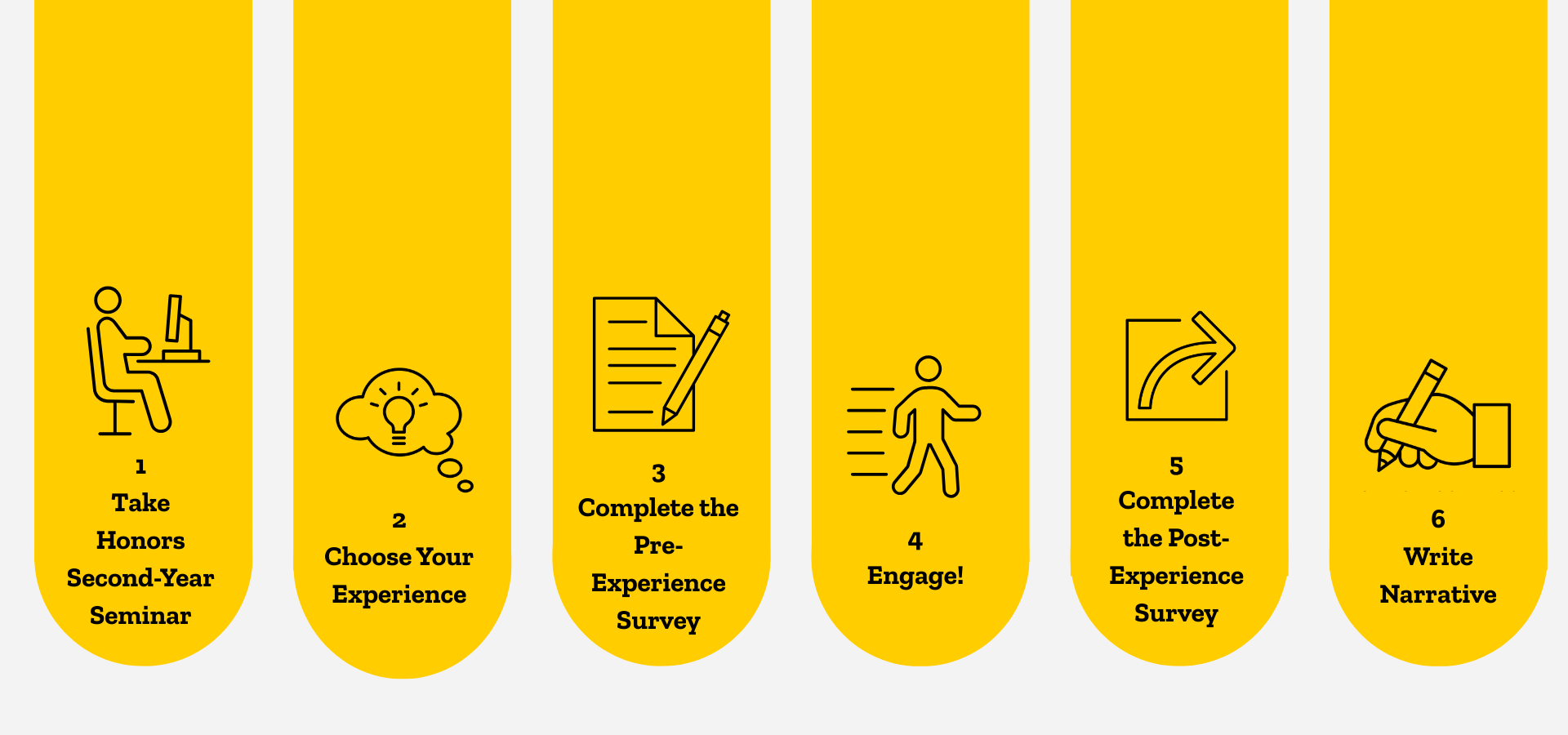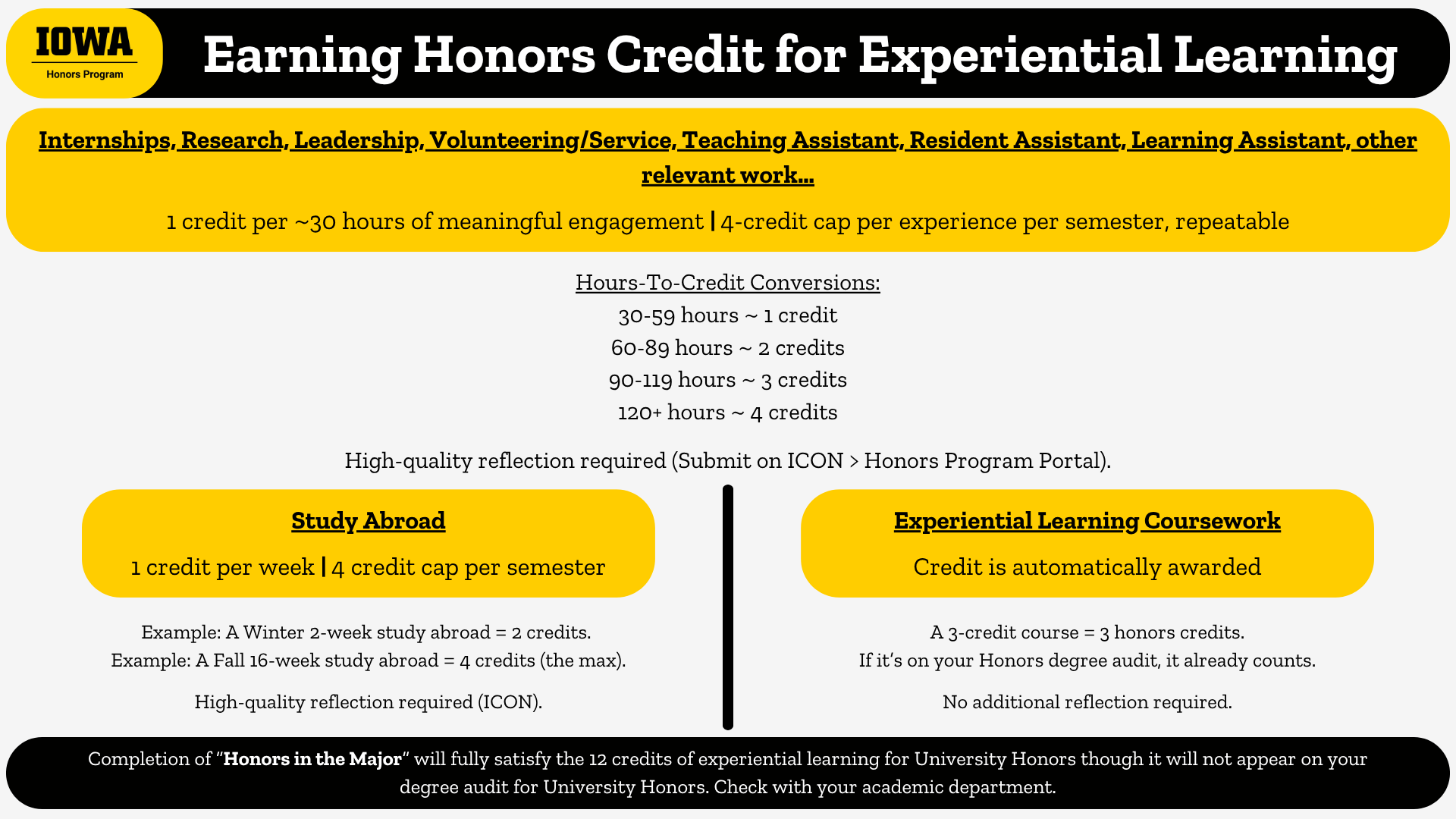Experiential learning (or learning-by-doing) enhances your personal, professional and academic experience. Opportunities include (but are not limited to) study abroad, internships, research, long-term volunteer work, teaching assistants, and relevant employment.
Process:
We encourage you to start experiential learning as soon as possible.

Reflection
Meaningful experiential learning requires reflection which you will learn to do in the Honors Second-Year Seminar (HONR:2990). To get credit for your experiences, you'll complete the honors reflection process in the Honors Program Portal on ICON. If you do not have access to this ongoing course, please email honors-program@uiowa.edu.
The honors reflection process includes a pre-experience questionnaire, a post-experience questionnaire and a narrative.
Earning Your 12 Credits
Completing honors experiential learning requires multiple semesters/summers. A yearly practice of reflection is part of the Honors at Iowa experience and starts with completion of the Honors Second-Year Seminar (HONR:2990).
- Track your hours. Typically, one semester or summer of experiential learning (8+ hours per week for 15 weeks) ~ 4 experiential learning credits.
- Four experiential learning credits is the maximum number of credits that can be earned per experience per semester.
- As soon as April or May of your second year you will submit your first reflection even if your experience has not yet concluded.
- For each additional year in an experience expect to submit an additional reflection.

Types of Experiential Learning
- Honors in the Major
- Study Abroad
- Research
- Service Learning
- Internships
- Teaching/Learning Assistantships
- Experiential Coursework
- Honors Experiential Learning Grant
- Email honors-program@uiowa.edu if you have questions about your experiential learning.

Experiential Learning FAQ
Q: When should I submit a reflection to earn experiential learning credit?
A: Submit your reflection around the end of your experience and, ideally, within five weeks of the end of the experience. This makes for better quality reflections and more benefit from the process.
Q: Can I get retroactive experiential learning credits? Is there a limit to how far back the experience took place?
A: Yes, the earlier you can reflect, the better but we will still award credits after the five-week submission window has passed. You can report any experience that happened after your first day as a student at Iowa.
Q: Do you have to complete a pre-questionnaire/post-questionnaire/narrative every semester for the same experience?
A: We promote an annual process of reflection. Student should begin to submit reflections in their second year and then each year until their 12 credits are complete.
Q: Can working for a job outside the university or volunteering count as Experiential Learning?
A: Yes, but there will be some subjective review of the experience. The more connected the job is to your academic goals the more credit that can be awarded.
Q: Can I earn credit for positions in which I was paid?
A: Yes!
Q: How many experiential learning credits can you earn through a study abroad program?
A: For any experience the cap is 4 credits per semester. With study abroad you earn 1 credit per week up to 4 weeks.
Q: Do I have to pay for experiential learning credits?
A: No. For experience that are not courses, credit is awarded but are not academic credits and therefore have no associated tuition.
Q: What's the best way to find experiential learning opportunities?
A: Speak with a peer mentor to explore your options and get connected to campus partners where you can get further information and insights. The Honors Program also hosts an Experiential Learning Fair in the fall where you can talk to peers about their experiences. Check the Honorable Messenger for other opportunities.
Q: What are my options?
A: While not an exhaustive list, here are some options: Mentored research, internships, clinicals, practicums, study abroad, service, volunteering, student organization participation and leadership, being a resident assistant, teaching assistant, writing fellow, or applying to a major scholarship or fellowship (such as the Fulbright, Goldwater, or Rhodes).
Q: Does Honors in the major count as experiential learning?
A: Yes. Honors in the major is a set of upper-level honors courses and research experiences unique to your individual academic department and is independent from University Honors. Students who complete Honors in the major will automatically satisfy the full 12 hours of experiential learning.